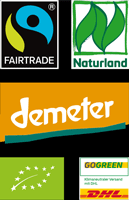- Green Lifestyle
Let’s talk about money. Part 2: Green investments.
The coffee is steaming and smells wonderful – and after I’ve been avoiding it for a while now, it’s definitely time to deal with the (tiring) topic of (my) finances. There are plenty of ways to invest money, so much is clear. And since money rules the world, everyone has a lever to make this world a little better. The only question is: How?

Kristin Oldenburg
Let's ask the financial expert.
Hanna Hornberg is Director of Sustainable Investments, Impact Investing, and Alternative Investments at one of the leading investment houses in the German-speaking region. She also works as a lecturer at the European Business School. We asked her how she would deal with the topic of “green investments”.
“In business and on the stock market, there is no black and white, but – as in real life – all shades of gray. This also (and especially) applies to sustainable investments. Of course, you don’t want to have anything to do with weapons, environmentally harmful chemicals, non-transparent supply chains, dubious financial transactions, and the like. So: Either you have a trusted banker to advise you. Or you fight your way through imaginative, trustworthy appearing advertising brochures, web pages, and sometimes dust-dry legal texts.
Regardless of which path is chosen, you should determine the following points for yourself: How much money do you want to invest? Once or regularly? And what do you want to achieve or – almost more important – what do you not want? It is very helpful to establish focal points: Is it environmental protection? Is it social/societal aspects? Or do you primarily want good and transparent corporate governance?
All aspects are justifiable, it should just not be too many at once, because then it will be increasingly difficult to find an appropriate target investment. Choose the topic that is closest to your heart! And then – inevitably – the search begins. In the end, however, don’t forget to pay attention to fees and compare all terms!” (Hanna Hornberg, Feri AG)
Which brings us to the topic of “What can you do as a small(er) investor?”
The three simplest forms of investment.
Despite the fact that we are not bankers, we are not advisors, and we are certainly not financial professionals, here’s a quick rundown of simple investment options.
1. The fixed deposit account. This means you lend your money to a – green – bank for a fixed period of time and get interest for it. On the one hand, this form is very transparent and safe, because you know in advance what interest you will get. And the money is protected by the statutory deposit guarantee up to 100,000 euros, even if the bank goes bankrupt.
2. Index funds, also called ETF. With an index fund, you do not invest in just one company, but in many different ones. In the case of an index fund, it is “only” the companies in the corresponding index: So, in the DAX, for example, are the 40 largest companies in the German stock market. Or in the case of the MSCI World, which reflects the performance of corporations from 23 industrialized countries, are more than 1,500 companies around the world (as of June 6, 2023).*
3. Managed funds. This is where your trusted banker or fund manager comes into play. They decide (according to your criteria) in which funds to invest. Whereby it is usually about maximum return (and of course you also have to pay the fund manager for his work).
This is a very short overview of the simplest investment options. In the end of this article, you find some links if you are interested to dive deeper into this topic. It is definitely worth a browse.
And the anti-greenwash formula...?
If there is one, it is called: Check. Check again. And then again. Pretty brochures with romantic forest views or sunflowers on the cover simply mean nothing. Instead, take a look at the so-called “obligatory information sheets”. They are binding and legally effective. This means that what is written here must be true or verifiable. The “Fair Funds” platform (see link below) is a good source of information. There is a database where you can see whether and to what extent the fund contains “controversial companies”.
That’s a lot of information for a morning coffee. But it’s not an easy subject, especially if you don’t want to invest in fighter jets, nuclear power plants, or glyphosate. But the effort pays off – in the truest sense of the word. Of course, all our information applies explicitly to Germany – but it’s a good inspiration no matter where in the world you’re sitting and enjoying your coffee.
Linklist:
www.handelsblatt.com/finanzen/etf-portfolio-erstellen-einfache-anleitung-fuer-anleger-in-sechs-schritten/28168128.html
www.test.de/Fonds-im-Test-Fuenf-Punkte-fuer-die-Besten-4331006-tabelle/
utopia.de/ratgeber/gruene-geldanlagen-so-sparst-du-nachhaltig/
www.geld-bewegt.de/sites/default/files/2018-07/Broschuere-ethisch-oekologische-Geldanlage_2018.pdf



